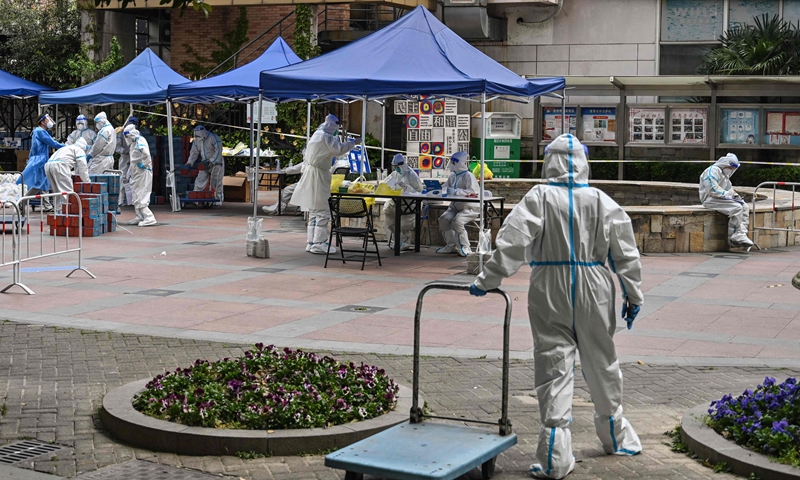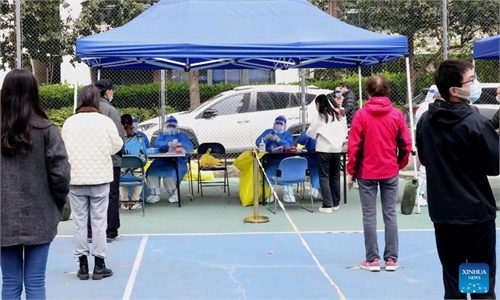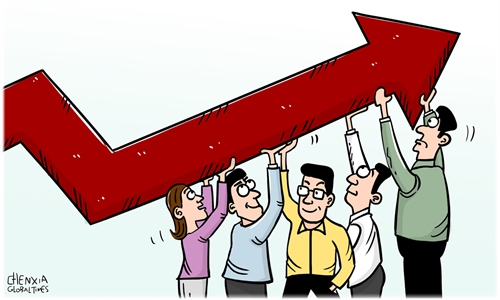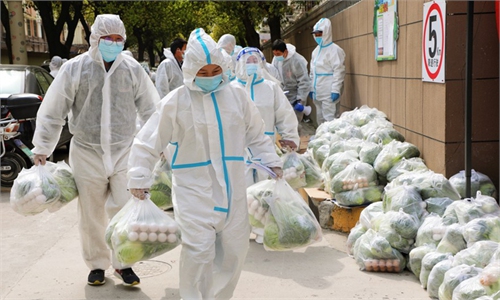Shanghai must adhere to dynamic zero-COVID policy, detect and deal with virus spread faster: top Chinese health expert

Health workers wearing personal protective equipment are seen while waiting for residents for nucleic acid tests in a compound on April 9, 2022. Photo: VCG
"Dynamic zero-COVID" is still the general policy in China's fight against the pandemic, it is also the most suitable response for Shanghai, said Liang Wannian, head of the COVID-19 response expert panel under National Health Commission (NHC) on Sunday. What Shanghai needs to do now is to detect and deal with the spread of the virus more quickly, he said.
"The outbreak in Shanghai has shown wide community transmission, especially within families. So, the overall prevention and control situation is extremely serious and complex," Liang said, adding that "according to the epidemiological parameters of the Omicron variant, no exponential and rapid rise is now seen in Shanghai."
This indicates that the prevention and control strategies and the measures adopted are playing an important role in containing the exponential rise, which is very important, said the NHC expert in an interview with Chinese media on Sunday.
Liang also stressed the importance for Shanghai to insist on the dynamic zero-COVID policy to control the virus. "We do not ask for zero infection or zero tolerance for the virus," he said, noting that the essence of "dynamic zero" is speed and precision.
"China insists on the concept of 'people first, life first' and has the conditions and abilities to adhere to the current prevention and control strategy," Liang said.
"Shanghai is racing against time with the Omicron BA.2 strain. We must contain it by acting faster to detect the spread and deal with it," according to Liang.
The current outbreak in Shanghai is characterized by the very rapid and insidious spread of the Omicron BA.2 variant, he said.
As of today, there are infected cases in the vast majority of communities in Shanghai with widespread community transmission. This means that it is very difficult to rely on the way to fight Delta variant alone to fight the Omicron variant, which has a wide ripple effect. More decisive and determined measures must be taken, Liang said.
The anti-epidemic expert said that for Shanghai, a city of 25 million people, it is very challenging for all parties to work together to complete a certain action such as full nucleic acid testing within a certain time.
Liang also noted that Shanghai's prevention and control of the current outbreak faces a lot of pressure. In addition to preventing the spread within the city, it is also necessary to prevent both a spillover from other provinces and imported cases from other countries.
Throughout China's multiple fights against COVID-19 across the country, the dynamic zero-COVID strategy is in line with China's reality and is also the best choice for China right now, Liang said.
China can balance the epidemic control and socioeconomic development and has become the only major economy that sees growth during the pandemic, he said in an earlier interview.
Liang stressed that "lie flat" is certainly not an option for China. If used well, the "dynamic zero-COVID" policy will yield the greatest benefits at a fraction of the cost.
"China is generally 'clean,' while some countries have lost the chance of achieving a clean slate," Liang told the media, stressing that "we have the toolkit and, most importantly, China has a strong institutional advantage."
Shanghai has reported more than 130,000 COVID-19 infections in its latest outbreak since March. In the past few days, the city has consecutively reported over 10,000 daily infections.
Explaining the high number of infections, Liang pointed out that the rounds of citywide antigen testing and nucleic acid testing in Shanghai have unveiled previously undetected infections through a proactive response. "There is widespread community transmission of the virus in Shanghai which must be detected by proactive screening, a step that, if not taken, would have caused an exponential increase in the number of infections," he highlighted.
The number of daily cases shows that wide static management and screening has worked, said the top health expert.
Liang also advised Shanghai residents to be confident, trust the policy, not to panic or be overly anxious, and not to make up and believe rumors.



